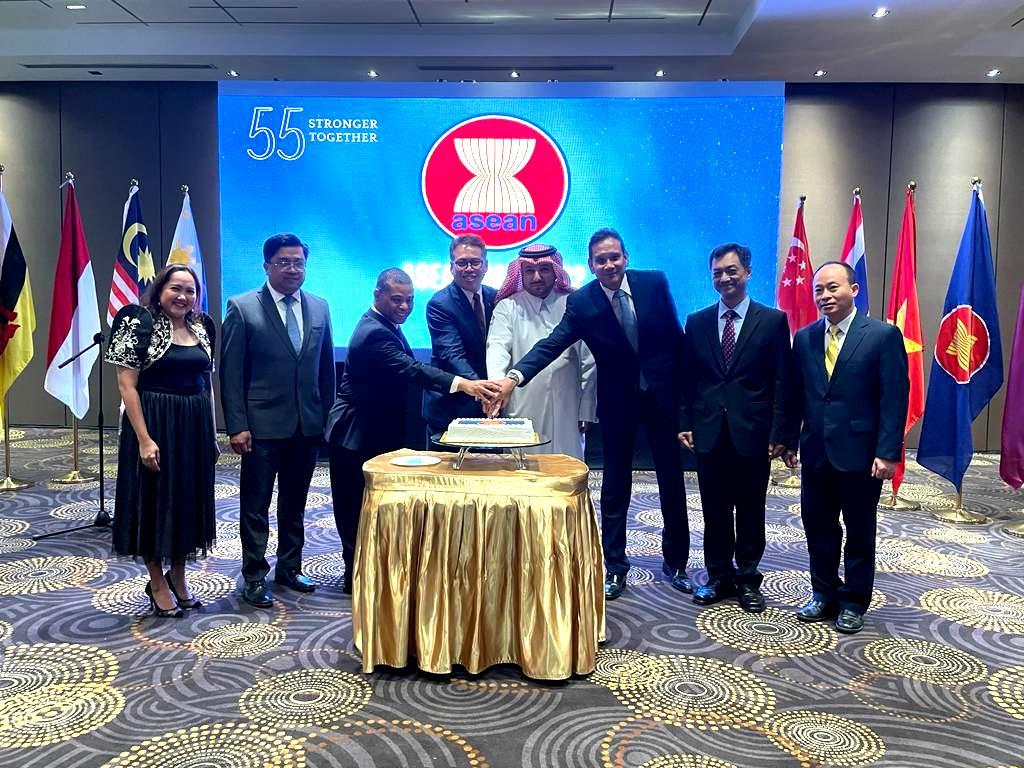
ASEAN: Stronger Together
This year marks the 55th anniversary of the establishment of the Association of Southeast Asian Nations (ASEAN). The five Founding Member States of ASEAN were Indonesia, Philippines, Malaysia, Singapore, and Thailand. Subsequently, Brunei Darussalam, Viet Nam, Lao PDR, Myanmar, and Cambodia joined the bloc.
The Member States of ASEAN welcome the accession of the State of Qatar to the Treaty of Amity and Cooperation (TAC) on the sidelines of the recently held 55th ASEAN Foreign Ministers' Meeting in Phnom Penh, Cambodia. The instrument of accession was signed by the Deputy Prime Minister and Minister of Foreign Affairs, His Excellency Sheikh Mohammed Bin Abdulrahman Al Thani. His Excellency Sheikh Mohammed also embarked on a tour of Southeast Asia after that, with official visits to Singapore, Malaysia, and Viet Nam, during which he reaffirmed Qatar's commitment to the region.
Qatar's accession to the TAC attests to its strong and growing political and economic ties with ASEAN. Qatar's total trade with ASEAN amounts to an estimated US$9 billion annually. Qatar is also a key investor in ASEAN, with investments in the energy, financial, real estate, telecommunications, agribusiness, hospitality, and medical sectors.
Prominent Qatari companies such as Ooredoo, Nebras Power, and QNB Group have established a presence in Indonesia. Baladna is expected to invest US$1 billion in the Malaysian dairy industry, and is eyeing similar projects in Indonesia and the Philippines. CDC Qatar is leading a seaport project worth US$300 million in the Quang Ninh province of Viet Nam. Qatari investments into Singapore are estimated at around US$3 billion, many of which are in the energy, financial, insurance, and real estate sectors. The Qatar Investment Authority (QIA) has also established a wholly-owned advisory subsidiary in Singapore to source investment opportunities in Asia.
ASEAN Member States' investments in Qatar have likewise grown steadily, with notable projects already existing in the oil and gas, hospitality, ICT, construction, and retail sectors. As key food exporters, some of the ASEAN Member States also play a vital role in supporting Qatar's food security efforts as part of its National Vision 2030.
With ASEAN on track to become the 4th largest economy in the world by 2030, there is great potential for the partnership with Qatar. The total combined GDP of ASEAN member states is valued at some US$3.2 trillion. ASEAN also boasts a young population – more than 60% of the 700 million people in ASEAN are under the age of 35.
The COVID-19 pandemic and the current situation in Ukraine have caused supply chain disruptions, economic uncertainties, and deferment of investment by multinational enterprises. ASEAN recorded a decline in foreign direct investment (FDI) in 2020 to US$137 billion, down from its highest-ever inflow of US$182 billion in 2019, when it was the largest recipient of FDI in the developing world. Despite the decline, ASEAN remains an attractive investment destination.
The region's share of global FDI rose from 11.9% in 2019 to 13.7% in 2020, while the intra-ASEAN share of FDI in the region increased from 12% to 17%. Additionally, the longer-term trend shows that the value of international project finance in ASEAN has doubled from an annual average of US$37 billion in 2015–2017 to an annual average of $74 billion in 2018-2020. The overall outlook is therefore promising for ASEAN.
Notably, the ASEAN-led Regional Comprehensive Economic Partnership (RCEP) agreement came into force on 1 January 2022 for Australia, Brunei Darussalam, Cambodia, China, Japan, Lao PDR, Malaysia, New Zealand, Singapore, Thailand, and Viet Nam. RCEP is the biggest regional Free Trade Agreement in existence and will cover 30% of global GDP and 30% of the world population. It also accounts for over one-quarter of global trade in goods and services. With the RCEP, ASEAN resolves to keep markets open while strengthening regional economic integration towards post-pandemic inclusive recovery.
Against this positive backdrop, there is potential for Qatar and ASEAN to strengthen cooperation in various fields such as renewable energy, climate change, sustainable development, agribusiness, education, ICT, and tourism and hospitality. We welcome Qatar's engagement of ASEAN, and look forward to a mutually beneficial partnership. Stronger together!

Legal Disclaimer:
MENAFN provides the
information “as is” without warranty of any kind. We do not accept
any responsibility or liability for the accuracy, content, images,
videos, licenses, completeness, legality, or reliability of the information
contained in this article. If you have any complaints or copyright
issues related to this article, kindly contact the provider above.


















Comments
No comment